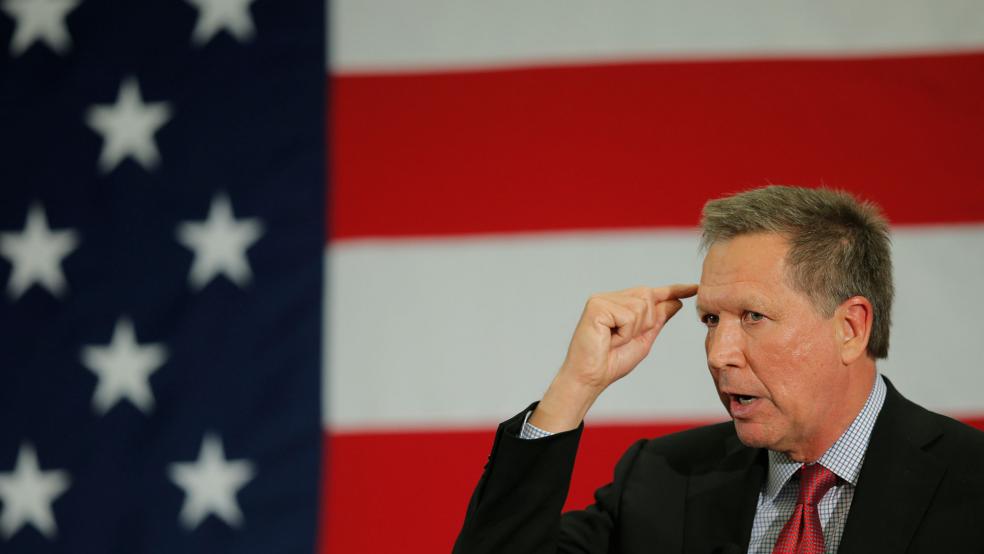Microphone in hand, Republican John Kasich promised the crowd inside a high-tech Ohio factory Saturday that he‘d never be beholden to Washington insiders if he wins the White House in November.
Behind the scenes, strategists for Kasich, the Ohio governor, are studying arcane party rules that they believe could offer a path to the Republican nomination if he wins his home state, his aides said.
It is a long-shot strategy, for both Kasich and the anti-Trump forces inside the party. But since fellow GOP candidate Marco Rubio lost his own state of Florida on Tuesday, a surge by Kasich may be the only viable strategy for Republicans looking to stop Trump from getting the 1,237 delegates needed to clinch the nomination.
Related: How Tuesday’s Primaries Will Affect Who Controls the Senate Next Year
The loss by Rubio, a senator, ends his struggling candidacy. The Kasich camp sees a Rubio loss in Florida opening up a different possibility – the first contested convention held by either party since 1952.
"The plan is to win Ohio, and some other states, and if that happens, nobody is going to have enough delegates to win the nomination on the first ballot," said John Weaver, Kasich's chief campaign strategist, who also worked on Republican Senator John McCain's losing presidential campaigns in 2000 and 2008.
Kasich supporters bet that his Ohio win gives his candidacy its first real momentum, attracting donors and endorsements. From there, he could score more victories in upcoming primaries in Pennsylvania, Maryland, Wisconsin, Connecticut and California, states where Kasich polls favorably.
He has almost no hope of winning enough delegates to secure the nomination outright. But if he can succeed in blocking Trump from getting a majority, Kasich can make a case to convention delegates that he is more electable than Trump or Ted Cruz, the conservative evangelical from Texas and, to date, Trump's most successful Republican rival.
Related: Why the Democratic Presidential Race Will Drag On for Months
To become the nominee who faces Hillary Clinton or Bernie Sanders — the two leading Democrat candidates — a Republican needs to win a majority of the 2,472 Republican delegates. Trump is leading, with 568, followed by Cruz with 370, [Rubio at 163] and Kasich at 129.
If no candidate reaches that threshold by the close of the last primary on June 7, then the convention will almost certainly be contested — a historical rarity that would signal deep party rifts.
1940 CONVENTION
Kasich’s aides are looking to history as a guide, particularly Wendell Willkie’s path to 1940 Republican nomination. That year, three leading candidates – Robert Taft, Thomas Dewey and Arthur Vandenberg – each arrived at the convention without enough delegates to win.
Willkie - a businessman and former Democrat who had never before run for public office - opposed the Republican Party’s isolationists and was a supporter of Great Britain’s war efforts. His cause gained momentum after the Nazi blitzkrieg in Europe in May 1940. At the convention, after six ballots, delegates in Pennsylvania, New York and Michigan deserted other candidates and switched to Willkie, giving him victory.
Trump, Cruz and Kasich could face the same scenario this year, which would force to them to lobby delegates on the convention floor until one emerged with a majority. The Kasich campaign and Republican elites – many of whom have a distaste for both Trump and Cruz – are planning for just such a scenario, Weaver said.
Related: Trumpcare Would Cut Coverage to 21 Million, Cost up to $500 Billion
But because it has been more than a half century since the last brokered convention, he said, “Nobody knows exactly how this works.”
AN OUTSIDER WITH INSIDER HELP
Despite 18 years as a Republican lawmaker, and now six as Ohio governor, Kasich has cast himself as a Washington outsider in hopes of tapping the anti-establishment mood that has fueled Trump’s once-improbable front-runner status.
"Guess what? The establishment is afraid of me because I don't take orders from anybody over there,” Kasich said in a recent television interview. At other times, he appears to revel in his Washington experience. “I took on Washington and I won. I actually got the budget balanced when I was a member of the Congress,” he said in a March 11 debate.
The Republican establishment is watched Kasich and Ohio’s Tuesday primary closely, said Charlie Black, a Republican strategist and a former adviser to Mitt Romney, the Republican 2012 presidential nominee, who recently blasted Trump’s campaign. He said Kasich’s win means he'll see a pick-up in donors, and in help from members of the party.
Ford O'Connell, a Republican strategist not affiliated with any presidential candidate, expects Kasich to face a tough battle after his Ohio win. “For some of these anti-Trump voters, if they can get Kasich to a contested convention, they see that as their best hope of blocking Trump."




